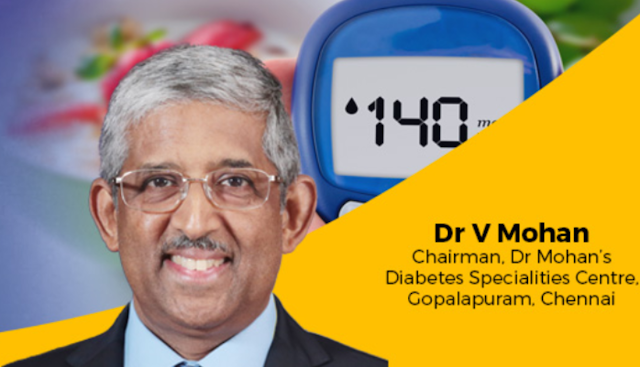Is Stress the Cause of Your Diabetes? By Dr V Mohan, Chairman, and Chief Diabetologist
Whenever we think of the causes of diabetes, we usually think
of heriditory factors (family history), overeating or lack of exercise leading
to obesity as the most common causes. While this is true, we often tend to
forget an important cause of diabetes – stress. Stress is defined as “a
physical, chemical or emotional factor that causes physical or mental tension
and may be a factor in disease causation”. Several diseases can be caused or
worsened by stress and diabetes is also one of the important ones.
How does stress affect the blood
sugar levels?
The blood sugar levels are controlled
mainly by two groups of hormones. The first group of hormones reduces blood
sugar but insulin is the only member of this group. The second group called
counter-regulatory hormones, opposes the action of insulin and increases the
blood sugars. There are several of these hormones and the list includes
cortisol, adrenaline, noradrenaline, glucagon and growth hormone. Stress tends
to increase the levels of the counter-regulatory hormones, particularly
cortisol, adrenaline and noradrenaline. If the levels of these hormones are
persistently elevated, this can precipitate diabetes in a predisposed
individual or worsen the diabetes control in someone who already has the
disorder.
Mrs. S, a 52 year old lady visited me
some time ago. She had abnormally high blood sugars – over 600 mg/dl. Despite my best
efforts to control her sugar with high doses of insulin and tablets, the sugar
remained above 350 mg/dl. Then, suddenly one day after 3 – 4 months, the sugar
levels started dropping. We had to withdraw the insulin and later, stopped all
her diabetes tablets also. She told me that she was now eating sweets and
chocolates every day but her sugars remained normal. She then opened out to me
and said that her husband had been having an affair with another lady in his
office which produced great stress in her life and that was why she had
developed diabetes. After a few months, the other lady had got transferred to
another city and her husband came back to her. Her diabetes disappeared! This
may sound like a script from a movie but truth is stranger than fiction!
It is important to detect high stress levels in a patient, since the blood sugars
will come down only if the stress is relieved or controlled. Doctors should
always think of two things; when they see any patient with unexplained high
sugars, or in someone whose diabetes is not under control in spite of optimum
use of diet, tablets and insulin a hidden infection somewhere in the body or
stress. Reduction of stress often leads to dramatic improvement or even cure of
diabetes, as shown in the case above.
How can stress be dealt with?
Very often, individuals do not
realize that they are under stress and even if they do, they deny it. The first
step in stress management is to make the patient understand that
everyone in the world is exposed to some stress or the other at some time in
their lives. In fact, a mild degree of stress may actually be good for us as it
raises our level of performance. Even Sachin Tendulkar recently admitted that
even now he does feel mildly anxious every time he goes into bat. However, one
should be alert to the signs and symptoms of excess stress, as they may be
quite subtle and yet can be serious, and even dangerous.
One should try and accept stressful
situations as “challenges” and not as “threats”. Many doctors tend to treat
symptoms of stress with anxiolytic or anti-depressive medications without
tackling the root cause of the stress. This approach could lead to harmful
side-effects. Therefore, the correct approach would be the use of stress
management techniques like diet, exercise, meditation, yoga and other forms of de-stressing. This approach would
help to identify the underlying cause of stress and correct it. The help of a qualified
clinical psychologist
or counselor can be of great help in many cases as they would often have more
time to spend with the patient than a busy physician.
Stress is a part and parcel of our
modern, fast-paced lives. Following a healthy lifestyle with adequate exercise,
correct diet and regular sleeping hours will keep
one physically and mentally fit to face any stressful situation that may arise
in one’s life. It is particularly important that a person with diabetes learns how to manage stress, since stress can wreak havoc with
the management of diabetes. A healthy social life, taking time out to relax
with friends and family is vital in reducing stress levels, thereby reducing
the risk of developing diabetes and helping people with diabetes take control
of their condition. We have seen many patients who were able to reduce their
dose of drugs and several cases like the one described previously, who were
able to completely stop all anti-diabetic medications. Find out if stress is
the cause of your diabetes, and if yes, please start stress management measures
today. You cannot
avoid stress but you can certainly manage it!
TIPS ON COPING WITH STRESS
- Accept
whatever has happened
- Practice
better time management
- Improve
organizational skills
- Resolve
conflicts
- Yoga
(eg, Pranayama) and Meditation
- Regular exercise
- Relaxation
techniques
- Eat
moderately and at proper times
- Proper
sleeping hours
- Seek support whenever necessary either from a family members or professionally
For More Details,
Call Immediately: 7825888631,
044 4396 8888
Website: https://drmohans.com/
copywrite@www.drmohans.com





Comments
Post a Comment